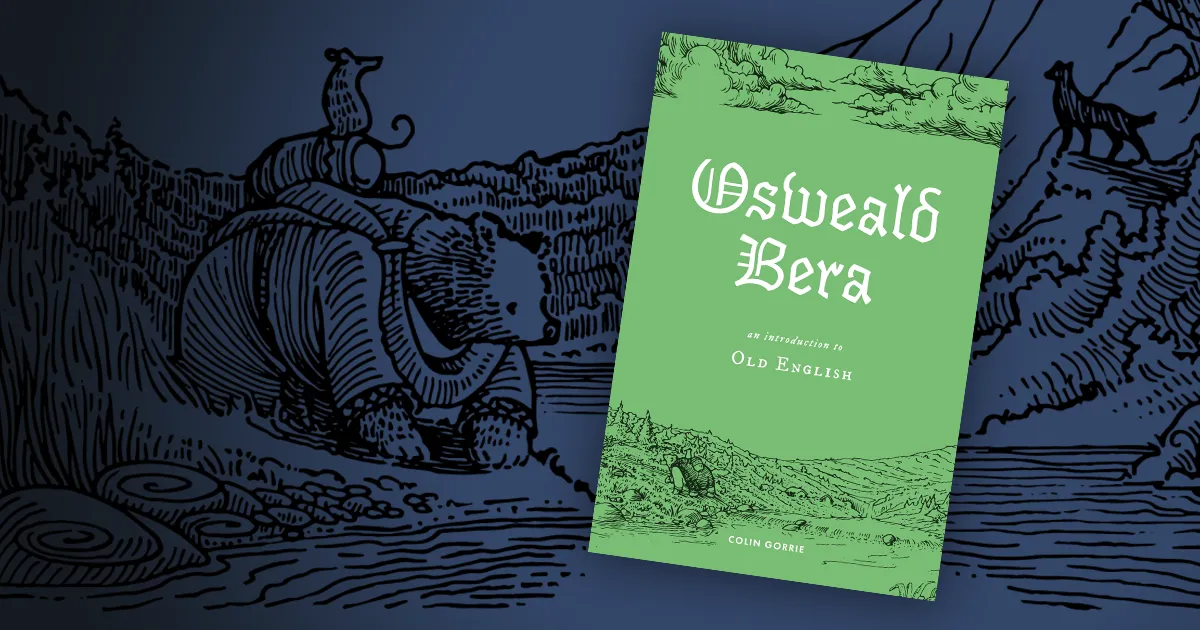This is the third in a series of Old English readings. If you haven't read the previous entries in the series yet, start there.
Like the previous texts, this text is lightly adapted from Sweet's reader.
I have added explanatory notes for:
- All the words that did not appear in the previous reading,
- All words not on the basic vocabulary list
- All grammar points that might be tricky for a beginner
Happy reading!
Matthew 13:3–8
Today's reading is from the Gospel of Matthew. Here is the complete text.
Sōþlīċe ūt eode se sāwere his sǣd tō sāwenne. And þā þā hē sēow, sume hiġ fēollon wiþ weġ, and fuglas cumon and ǣton þā. Sōþlīċe sume fēollon on stǣnihte, þǣr hit næfde myċle eorþan, and hrædliċe upp sprungon, for þām þe hiġ næfdon eorþan dȳpan; sōþlīċe upp sprungenre sunnan, hiġ ādruwedon and forsċruncon, for þām þe hiġ næfdon wyrtruman. Sōþlīċe sume fēollon on þornas, and þā þornas wēoxon, and forþrysmodon þā. Sume sōþlīċe fēollon on gōde eorþan, and sealdon wæstm, sum hundfealdne, sum sixtiġfealdne, sum þrittiġfealdne.
Let's break it down into more manageable parts.
Sōþlīċe ūt eode se sāwere his sǣd tō sāwenne. Now out went the sower to sow his seeds.
- ūt out.
- eode went. Irregular past tense of gān to go in its 1st/3rd person singular form.
- sāwere sower. From the verb sāwan to sow (seeds).
- sǣd seeds. Accusative plural (or singular) of sǣd seed.1
- tō sāwenne to sow. Sāwenne is the inflected infinitive of sāwan to sow. The inflected infinitive is used to express purpose, among other things.
And þā þā hē sēow, sume hiġ fēollon wiþ weġ, And when he sowed, some of them fell along the road,
- þā þā when.
- sēow sowed. Past tense of sāwan to sow in its 1st/3rd person singular form.
- sume some. Nominative plural neuter strong form of sum one, a certain; some.
- hiġ they. Variant form of hīe they.2
- wiþ against; along; with.
- weġ way, road.
and fuglas cumon and ǣton þā. and birds came and ate them.
- fuglas birds. Nominative plural of fugol bird (> fowl).
- ǣton ate. Past tense of etan to eat, in its plural form.
- þā them. Neuter accusative plural of hīe they.
Sōþlīċe sume fēollon on stǣnihte, þǣr hit næfde myċle eorþan, Now some fell on stony (places), where it did not have much earth.
- stǣnihte stony (ones). Variant form of stāniht stony. Accusative plural neuter strong form, governed by on onto).
- þǣr where.
- næfde = ne hæfde did not have.2 Hæfde is the 1st/3rd person singular past tense form of habban to have.
- myċle much. Feminine accusative singular strong form of miċil much, many, agreeing with eorþan earth.
- eorþan earth. Accusative singular of eorþe earth.
and hrædliċe upp sprungon, for þām þe hiġ næfdon eorþan dȳpan; And at once they sprang up, because they did not have depth of earth.
- hrædliċe promptly, at once.
- upp up. Variant form of ūp.
- sprungon sprang. Past plural form of springan to leap; burst forth; spring.
- for þām þe because.
- eorþan of earth. Genitive singular form of eorþe earth.3
- dȳpan depth. Accusative singular form of dȳpe depth (variant of dīepe).
sōþlīċe upp sprungenre sunnan, hiġ ādruwedon and forsċruncon, Then the sun having sprung up, they dried up and withered.
- sprungenre sprung. Feminine dative singular of (ġe)sprungen, past participle of springan to leap; burst forth; spring. In agreement with sunnan sun
- sunnan sun. Dative singular form of sunne sun. Together sprungenre sunnan is a dative absolute clause,4 which expresses the circumstances under which something has taken place. They have the structure X(dative) Y(dative), where X is usually a noun and Y is usually a participle. X and Y can appear in either order. You can translate these constructions as X having Y or with X having Y, as I have here with the sun having sprung up.
- ādruwedon dried up. Past plural form of ādrȳġan to dry up. The textbook past tense form of this verb is ādrȳġdon, but, in Old English as in so many things, real life isn't always like the textbook.
- forsċruncon withered. Past plural form of forsċrincan to shrink up, wither.
for þām þe hiġ næfdon wyrtruman. because they did not have roots.
- wyrtruman roots. Accusative plural of wyrtruma (var. of wyrttruma root).5
Sōþlīċe sume fēollon on þornas, Some, however, fell on thorns,
- þornas thorns. Accusative plural of þorn thorn.
and þā þornas wēoxon, and forþrysmodon þā. and the thorns grew, and choked them.
- þā þornas the thorns. Here þornas is nominative plural.
- wēoxon grew. Past plural form of (ġe)weaxan to grow. Compare Present-Day English wax, something the moon does for about half of the month.
- forþrysmodon choked. Past plural form of forþrysmodon to choke.
Sume sōþlīċe fēollon on gōde eorþan, and sealdon wæstm, Some, however, fell onto good earth, and gave fruit.
- gōde good. Feminine accusative singular form of gōd good. Accusative agreeing with eorþan earth, the phrase as a whole taking accusative due to on in its directional meaning onto.
- sealdon gave. Past plural form of sellan to give; betray.6
- wæstm fruit. From the same root as weaxan to grow. No descendant form survives in Present-Day English.
sum hundfealdne, sum sixtiġfealdne, sum þrittiġfealdne. some a hundredfold, some sixtyfold, some thirtyfold.
- hundfealdne hundredfold. Masculine accusative singular form of hundfeald, agreeing with an elided wæstm fruit.
- sixtiġfealdne sixtyfold. Ditto.
- þrittiġfealdne thirtyfold. Ditto.
References
- Sweet, Henry (1879). An Anglo-Saxon Reader in Prose and Verse. Oxford: Clarendon.
Footnotes
-
The word sǣd is the same in the singular and plural in the nominative and accusative cases. ↩
-
Nouns of this declension (called n-stems, or weak nouns) is sometimes difficult to translate because so many forms take the same ending: -an. ↩
-
The dative absolute construction in Old-English is comparable to the Latin ablative absolute construction. ↩
-
Etymologically, wyrttruma is a compound of wyrt plant (as in St. John's Wort) and truma troop of soldiers, which does not survive. ↩
-
The principal meaning of sellan in Old English was to give, and secondarily to betray, that is, to sell (someone) out. The main modern meaning involving commerce is a later development which only starts appearing at the very end of the Old English period. ↩

